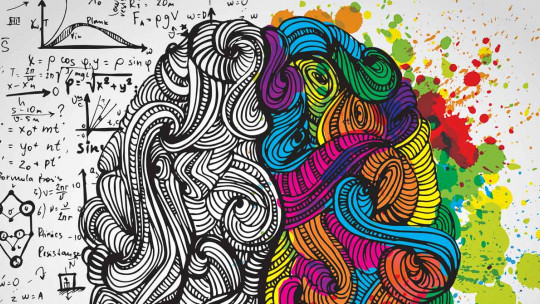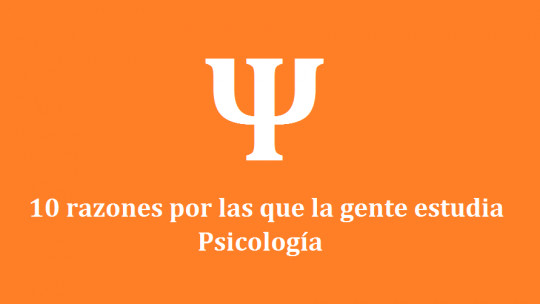In the collective ideology we have the image of psychologists as those people who are in their office and treat patients, people who surely have some type of psychological problem.
This image corresponds to what some psychologists do, but not all. Psychology is a very complex, extensive discipline and present in countless professional fields, which makes answering the question “What does a psychologist do?” It is impossible to answer it in a few words.
Below we are going to see in quite detail what psychologists do depending on the area in which we work and if we are occupying any administrative position.
What does a psychologist do?
Psychology is a fairly complex and extensive discipline, so much so that it covers many areas of intervention and is related to many professions. It touches on aspects of biology, sociology, education, statistics, neurosciences. and in turn it gives rise to all types of professionals specialized in different branches of the same, which means that it is not possible to give a short answer to the question “what does a psychologist do?” It will depend on what his branch of intervention is and what he has studied.
If you are consulting this article because you have considered the possibility of studying Psychology, first of all you must understand that all professions have their advantages and disadvantages, and that the case of psychologists is no exception. It is a job that, if you dedicate yourself to it by vocation and with true interest, provides you with moments of great personal and professional satisfaction.
However, and like everything in this life, there are also moments that can be very frustrating and disappointing, something that cannot be ignored before choosing Psychology as a university degree.
This is why it is so important document very well what a psychologist does before considering studying this discipline, advice that is applicable to any degree we are considering studying. It is not a question of choosing a career that appears easy and simple (it is not), but rather choosing a university degree that prepares us to carry out a job that fits our preferences, motivations and life objectives.
The professional training of the psychologist
Before talking about what exactly psychologists do according to their field of intervention, it is necessary to talk about what the basic professional training is to become a “plain” psychologist. In Spain, to become a psychologist it is necessary to study a university degree in Psychology, which in most cases lasts about four years, normally taking 32 subjects (192 credits), between 8 and 10 electives (24-30 credits), a final degree project (TFG) and internships in centers (6+12 credits).
During the first two or three years, the Psychology degree is aimed at students acquiring the epistemological pillars of the profession that is, knowing when and how this discipline emerged, what currents of thought exist, the basic psychological processes, research methods, the parts of the nervous system, the history of Psychology… It is also in this period in which they are studied. Mandatory subjects related to different areas of intervention, including clinical, education, social and research.
The knowledge taught in the degree is not easy to learn Being a psychologist is not simply about learning to listen. Although active listening is a fundamental skill in the profession of every psychologist, acquiring knowledge and knowing how to apply it in professional life are fundamental requirements of the profession, theoretical and practical knowledge that is difficult and causes many students to abandon the degree during the first and second year, discovering that they had chosen studies that were more difficult than they had imagined.
Ironically, they leave the degree at the best time, since it is from the third year onwards that there is more freedom to choose what to learn, being able to choose electives. The option is given to delve deeper into each of the branches of psychology, offering different mentions and facilitating the possibility of having a global and deep vision of everything that Psychology encompasses, something that certainly influences when finishing the degree and having to choose. post-university studies to specialize.
It should be said that one of the reasons why it is usually thought that all psychologists do psychotherapy has to do with the fact that many universities have a slight bias when it comes to teaching, giving importance to students acquiring skills and strategies about how to do therapy and how to solve psychological problems, typical of the clinical setting. This makes it not unusual for Psychology students to be a little disappointed when finishing their degree seeing that they have not had the opportunity to see other areas of Psychology in detail.

What do psychologists do according to their area of study?
The first big turning point for every psychologist comes when he finishes his degree and has to make a decision about what to specialize in. During the years we were studying the degree, our classmates and we had to focus all our cognitive efforts on memorizing and understanding what we had to learn, without making decisions in the middle. However, once the internship dossier and the TFG have been delivered, we have to face the big question: What do we do now?
The study offer that is presented to us once we have completed the degree is very varied, so much so that it makes it difficult to make a quick and safe decision about which path to choose to stop being “just” psychologists. There are many fields of specialization in Psychology and therefore it is advisable to narrow down the options to finally decide on one, something that is advisable to do at the beginning of the degree by investigating a little about each of the branches of Psychology and what the psychologist does. in each one of them.
We do not have to wait for the third or fourth course to discover what Forensic Psychology is or what an organizational psychologist does. We can take advantage of our university years by establishing contact with a professor at home who is specialized in a field that has aroused our curiosity, read their scientific publications, learn a little more about their work and, if possible, ask to collaborate or do internships. extracurricular activities to expand our training and have first-hand experience about what a psychologist does in such an area.
Below we are going to give a few details about what psychologists do depending on their area of study.
1. Clinical and health psychologists
Clinical and Health Psychology is the most popular area, corresponding to the generic idea of what a psychologist is and does: a person who treats patients. However, it should be noted that Clinical Psychology and Health Psychology are not the same.
A clinical psychologist is a professional who diagnoses and applies treatments for mental disorders such as depression, schizophrenia, generalized anxiety disorder…
Instead, A health psychologist focuses more on the cognitive, emotional and behavioral aspects associated with people’s health, as well as their physical illnesses. General Health Psychology would also fall within this area.
Both types of psychologists use different tools, such as interviews, questionnaires or self-reports to evaluate the main problems for which the patient has ended up in consultation, both voluntarily and under obligation. These psychologists They try to understand what the patient’s life experiences have been to understand what they are going through
The psychologist, after having explored what the main problems are after having carried out an exhaustive evaluation of the patient’s mental health, establishes with him the objectives to work on, respecting the pace required by the person concerned to fulfill them.
2. Educational psychologist
The educational psychologist performs several functions, among which we can find intervention in the educational needs of students along with guidance, professional and vocational advice, preventive functions family training and counseling, socio-educational intervention, research and teaching.
3. Social and organizational psychologist
We generally think of human resources when we hear about an organizational psychologist. Although not all organizational psychologists specialize in HR, we can find many who are dedicated to personnel selection, training and prevention of occupational risks and occupational health care
Organizational psychologists can also work in marketing departments, doing market research and discovering new formulas to make it easier for companies to better reach their potential customers.
The social psychologist performs functions related to research and intervention in terms of the collective, the group and interpersonal relationships We can find these psychologists working in various fields, including the sports world, gender violence associations, family intervention and community intervention.
4. Sports psychologist
In recent years, sports psychologists have gained a lot of fame thanks to the understanding that psychological variables in the world of sports are just as important as the physical, technical and tactical aspects. Sports psychologists are increasingly requested by managers of large sports teams their coaches and even their own athletes motivated by the Latin maxim of “Mens sana in corpore sana”.
Sports psychologists perform coach functions, although with proper training and with the title of psychologist and specific training under their arm. They are in charge not only of the group aspects in the case of a team sport, but also of individual aspects that affect each of the players. These professionals aim enhance the qualities and performance of athletes and also, evaluate the possible appearance of psychological problems such as stress and low self-esteem due to pressure.
5. Forensic psychologist
Forensic psychologists work in the legal field and no, they are not psychologists who “analyze the thoughts of the dead.” They are professionals who must master all the concepts, norms and dynamics of the legal system in which they practice their profession.
These professionals They collect, analyze and present psychological evidence that will be taken into account in judicial processes such as cases of gender violence, abuse of minors, murders or any crime in which the psychological part of the victims and the accused must be explored.
Among the functions performed by forensic psychologists we have: evaluation and diagnosis, expert advice to judicial bodies, in addition to working in mediation and victimology. It also intervenes in programs for the prevention, treatment, rehabilitation and integration of legal actors, both in the community and in the penitentiary center.
6. Clinical sexologist
Still little known, the figure of sexologists remains somewhat mysterious, unknown even by those who have graduated in psychology. They are professionals in psychology or health sciences in general who They have acquired skills and tools to improve the affective-emotional and sexual quality of life of their clients in their personal relationships
These professionals do not only address sexual problems from a purely physiological perspective, but also take into account the cognitive and emotional aspects behind their appearance in order to apply an intervention that is as complete and effective as possible, helping their clients to enjoy a healthy and pleasant sexual life.
Psychologists in public and private administration
In the previous section we have seen what psychologists do depending on their field of study. Now, we are going to talk about the role of psychologists in relation to what aspect of public administration they may have or if they have taken examinations to perform a certain job in society.
1. Resident Internal Psychologist (PIR) and psychologists in the private sector
In Spain, the PIR exam is aimed at granting the title of Psychologist Specialist in Clinical Psychology (PEPC) The only way to access is to pass the PIR exams and have enough grades to obtain a place.
Once the exam has been passed and the position has been obtained, the psychologist will spend four years in the public sphere acquiring valuable experience that will constitute a fundamental basis for his or her development as a professional.
However, as the PIR is an extremely complicated exam to pass and it is even more difficult to get a place, many choose the more earthly route of studying the General Sanitary Master’s Degree which, once obtained the title, allows them to work in the Private sanity.
2. Psychologist in the teaching field
Psychologists in the teaching field, mostly educational psychologists, are those who end up at different levels of the educational structure:
- Body of Secondary Education Educational Counselors.
- Body of Vocational Training and Guidance Teachers (FOL).
- Teaching in secondary and higher public education centers (all autonomous communities).
3. Jobs in justice and administration
Here we have professionals, many of them forensic psychologists, who work for justice and administration:
- Technical Bodies in Juvenile Courts
- Corps of Penitentiary Institution Technicians
5. Psychologist in the police
Psychologists can work within police forces in many countries Access will depend on each country and region, in addition to the type of police force you want to join (e.g. Civil Guard, National Police, Mossos d’Esquadra, Ertzaintza…).
- Related article: “Criminal psychology: characteristics and objectives of this applied science”
6. Psychologists in the Armed Forces
We also find psychologists in the Armed Forces. These professionals are known as military psychologists, but it is not that they are dedicated to a specific aspect of psychology within the army, the profile of these psychologists being one of the most complex and complete there is, performing all types of functions.
You could say that armies are like small societies in which psychologists are needed to perform functions associated with all their professional branches: education, clinical, organizations… Within the army, clinical psychologists are needed to treat problems of recruits (e.g., PTSD), sports psychologists to motivate them in their training, organizational psychologists to evaluate interpersonal relationships between soldiers, etc.
7. Local and regional administration
We also find psychologists in the local and regional administration. We can see psychosocio-educational intervention technicians and other technical positions, present in cultural centers, child care services special groups, career guidance…
8. Psychologists in research
Psychologists can also dedicate themselves to the field of research, both in a public and private institution. They can do it from any of the branches in which they have specialized such as clinical, social, educational, organizational…
As Psychology is a very extensive discipline, which touches on practically everything, the variety of topics that can be addressed through psychological research is very great. Everything that is related to human behavior and mental processes can be the object of study in Psychology research
9. Psychologists in teaching
Psychologists, like any other profession, They can act as teachers to share their knowledge with future professionals They can do this from any area of intervention and in any way, choosing to do university training, work in educational centers, academies.
- You may be interested: “Educational psychology: definition, concepts and theories”
What doesn’t a psychologist do?
In order to combat stereotypes, prejudices and myths related to our profession, we are also going to answer the question antagonistic to the one in the title of this article: what does a psychologist not do? Here is a list of what we should not expect a professional in the discipline of human behavior to do.
1. He doesn’t judge you
The task of a psychologist always seeks objectivity and avoids passing judgment. When you go to see one of these professionals, he or she will not judge you or evaluate what you tell them as positive or negative. He is not going to give you his personal opinion, but rather he will offer you his professional guidance.
2. He doesn’t talk like a friend
Going to the psychologist is not going for a chat like when you meet up with your friends or go to the bar to tell the waiter your sorrows. Psychologists evaluate problems and offer scientifically proven tools in order to provide a solution to the demands made by the patient but also helping them to take an active role in their own health.
3. It doesn’t say what you have to do
He’s not going to give you orders about what to do. The decision making falls to you as a patient or client, since it is your life that is being worked on. However, the psychologist does accompany you on the path you decide to take.
- Related article: “Why psychologists don’t give advice”
4. Don’t guess your future
Psychologists are professionals who have studied a science with knowledge of health sciences and social sciences. Psychologists do not read cards or tell fortunes, much less apply pseudoscientific techniques such as palm reading or astrology. If you happen to know a “psychologist” who uses any of these techniques, run away! and immediately report it to the nearest college of psychologists.
And by the way, The statement “I don’t believe in psychologists” doesn’t make any sense Psychologists are people who have studied at the university for several years, soaking up very complicated knowledge based on scientific evidence and who, once they have finished their degree, enter an even more demanding specialization.
They are professionals prepared and updated to work in the field in which they intervene, based on research that supports their professional practice at all times. In the same way that we should not question the professionalism and effectiveness of a doctor, a dentist or an engineer, we should not question the professionalism of a psychologist.









